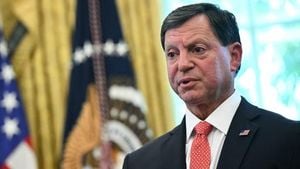On Monday, August 18, 2025, a group of Manhattan’s federal court judges made a decision that reverberated well beyond the walls of the Southern District of New York: Jay Clayton, a lawyer with deep Wall Street roots and a former chairman of the Securities and Exchange Commission (SEC), will remain as the U.S. Attorney for the Southern District of New York (SDNY). This move comes despite Clayton lacking the traditional Senate confirmation, a process that has grown increasingly contentious and politically fraught in recent years.
The announcement, delivered by Southern District Executive Edward Friedland, confirmed that Clayton would continue as U.S. Attorney until a Senate-confirmed successor is installed. The court’s brief statement didn’t delve into the judges’ deliberations or whether the decision was unanimous, but the outcome was clear: for now, Clayton holds the reins at one of the nation’s most prestigious and scrutinized federal prosecutor’s offices.
Clayton’s path to this role has been anything but typical. As reported by the Associated Press, he previously served as chairman of the SEC from 2017 to 2020, and before that, built a formidable reputation as a corporate lawyer at Sullivan & Cromwell in New York. However, he had never worked as a prosecutor before taking the helm at SDNY in April 2025, a fact that raised eyebrows among legal observers and inside the office itself.
President Donald Trump originally nominated Clayton for the post in January 2025. But the usual confirmation process hit a wall in April when New York’s senior Democratic senator, Chuck Schumer, announced he would block Clayton’s confirmation. With the Senate effectively sidelined, Trump appointed Clayton on an interim basis for 120 days, a window that expired this week. According to The New York Times, once that term ran out, it fell to the district’s federal judges to decide whether Clayton would stay or go. Their answer: he stays, at least for now.
In a statement released Monday, Clayton expressed gratitude for the opportunity to continue leading the office. “I am honored to continue serving the people of New York together with the talented and hardworking women and men of the Office,” he said, as quoted by the Associated Press. His words struck a tone of humility and teamwork, but they came amid a swirl of controversy and upheaval within the office he now leads.
The SDNY has recently been rocked by internal strife. Several prosecutors, including interim U.S. Attorney Danielle Sassoon, resigned after refusing to comply with Justice Department orders to drop corruption charges against New York City Mayor Eric Adams. The charges were ultimately dropped after prosecutors from Washington intervened, but the episode left scars. In another high-profile incident, Assistant U.S. Attorney Maurene Comey—daughter of former FBI Director James Comey—was fired after handling much of the prosecution in the trial of hip-hop mogul Sean “Diddy” Combs. Combs was acquitted of the most serious racketeering and sex trafficking charges, though he remains jailed awaiting sentencing on prostitution-related convictions. Clayton, for his part, has kept a notably low profile throughout these tumultuous events, issuing statements only after verdicts or guilty pleas, and declining to comment publicly on Comey’s dismissal. According to The New York Times, two former SDNY prosecutors criticized Clayton for his silence on the matter, suggesting that leadership in such moments demands a public stance.
Clayton’s appointment is remarkable not only for its circumstances but also for what it signals about the current state of federal law enforcement appointments. Traditionally, U.S. attorney nominations are subject to Senate approval, but the process allows for home-state senators—often from the opposition party—to block nominees. In such cases, the president may appoint an interim U.S. attorney for up to 120 days, after which federal judges in the district can decide whether to keep the appointee or select someone else. While it was once rare for judges to reject a president’s pick, this year has seen several such rejections, especially in districts where the Trump administration’s choices have proven controversial.
For example, in the Northern District of New York, judges rejected John A. Sarcone III, Trump’s nominee. The administration responded by naming Sarcone as a special attorney to the attorney general, allowing him to continue in a similar capacity without the official title. In New Jersey, federal judges turned down Alina Habba, another Trump pick, and appointed their own interim U.S. attorney. The Trump administration then fired the judges’ choice and reinstalled Habba as acting U.S. attorney—a move now the subject of a legal challenge awaiting a federal court ruling in Pennsylvania, as reported by the Associated Press.
Clayton’s relatively controversy-free tenure, at least compared to some of his counterparts, may have helped his case. According to CNN, his record on enforcement actions at the SEC did not attract significant political criticism, and his appointment to the SDNY was one of the few Trump nominations to pass without major opposition. Still, the broader landscape remains turbulent. The Senate has blocked most of Trump’s nominees to U.S. attorney positions, and federal judges are increasingly flexing their authority to shape the leadership of these crucial offices.
This tug-of-war between the executive branch, the Senate, and the judiciary has far-reaching implications. Analysts cited by CNN and The New York Times note that the process underscores the delicate balance of power at play during periods of administrative change. The interim appointment of figures like Clayton helps maintain stability and continuity in offices that oversee some of the nation’s most sensitive and high-profile investigations. But it also highlights the importance—and the limits—of the confirmation process, raising questions about accountability and independence in federal law enforcement.
Looking ahead, the future of U.S. attorney appointments in other districts will likely depend on ongoing political dynamics and the willingness of courts to assert their authority. For now, the SDNY—often called the “Sovereign District” for its reputation of independence—remains under the stewardship of a leader with strong ties to Wall Street, but little prosecutorial experience. Whether Clayton’s low-key style will help or hinder the office as it navigates ongoing legal and political challenges remains to be seen. But one thing is certain: the process that brought him to power is emblematic of a new era in the appointment of America’s top federal prosecutors.
As the dust settles, all eyes remain on the Southern District of New York, where the intersection of law, politics, and public scrutiny has rarely been more intense.





